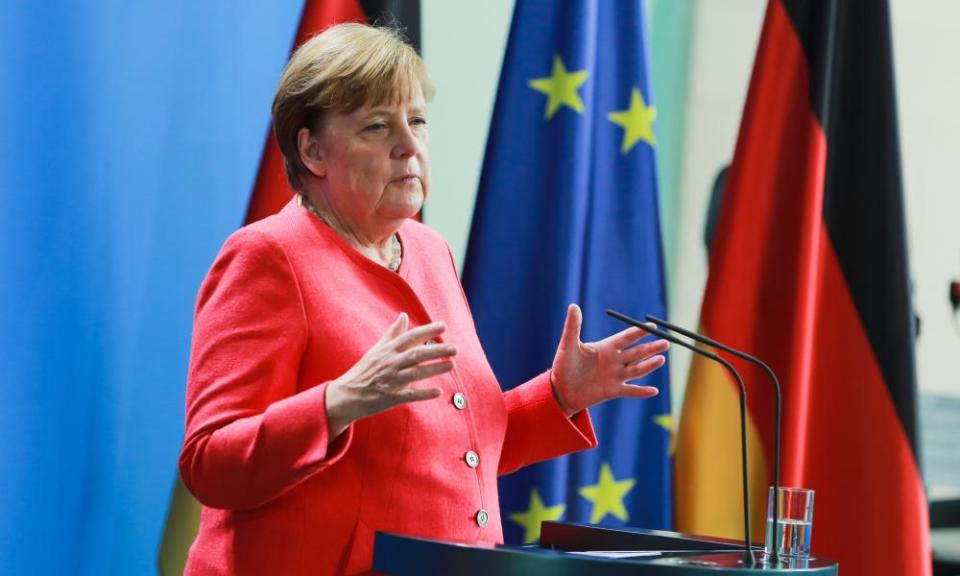Angela Merkel fears economic crisis is being underestimated in EU

Angela Merkel voiced fears that people do not appreciate what it will mean to slump into the “deepest recession since the second world war”, as EU leaders clashed over a recovery fund for the countries hit hardest by the coronavirus pandemic.
During a video conference call among the 27 heads of state and government, the German chancellor gave her backing to the French president, Emmanuel Macron’s call for agreement before the summer holidays on a €750bn rescue package.
Merkel said Europe faced “very, very difficult times” and mused on whether the gravity of the situation was truly understood as she addressed her counterparts phoning in from around the EU, according to diplomatic sources. The value of the economies of some member states are expected to shrink by up to 10% in 2020.
“It was clear that we wouldn’t reach a result today but we will continue discussions in mid-July,” Merkel later told reporters. “Everyone said what they thought was positive and of course brought in points of criticism too. The bridges that we still have to build are big.”
Macron had also urged his fellow leaders to find common ground next month, citing the need to calm the markets before a difficult phase of talks on the future trade and security relationship with the UK. Ireland, Belgium and the Netherlands want the recovery fund to offer them support in the event of the negotiation ending without a deal.
The European commission president, Ursula von der Leyen, conceded that “no one can say with certainty where these negotiations [with the UK] will be at the end of this year”.
During their first real talks about the pandemic rescue fund, the leaders provided starkly different views on the overall scale of the funds to be distributed, the balance of loans and grants and the criteria by which money is allocated.
Some EU leaders – including those representing the “frugal four” of the Netherlands, Austria, Sweden and Denmark – remain unconvinced by the need for condition-free grants.
One diplomat from one of the sceptical countries said: “If we as an EU are going to borrow money, we don’t want to say ‘yes’ first and only then work out what we spend it on, how we spend it and who gets what.
“Are you borrowing money to borrow or to invest? Then you first need to know what you are going to spend it on and how profitable it is. But the whole political discourse of some countries is exactly the other way around: give us money first and then everything will be fine.”
Charles Michel, the president of the European council, the body through which the heads of state and government are represented, told reporters at the end Friday’s discussions that he would organise a physical meeting of leaders in the middle of July in Brussels to start concrete negotiations on the EU’s long-term budget and the pandemic recovery plan.
“On some topics it remains very complex and very different,” Michel said. “We will work very hard to accelerate the negotiations in order to have an efficient and useful meeting in July.”
The commission has particularly upset some of the more hawkish leaders by suggesting that the allocation should in part be based on unemployment in the member states before the crisis.
Von der Leyen defended the EU executive’s proposal, insisting that the planned injection of funds, raised through common issuing of EU debt, needed to address the reasons why some countries suffered more badly than others.
She said: “The damaging effect was of course prominent in member states that were not resilient enough in the overall structure to absorb the shock of the crisis … This is very well represented in the unemployment rate over the last years.”

 Yahoo Finance
Yahoo Finance 